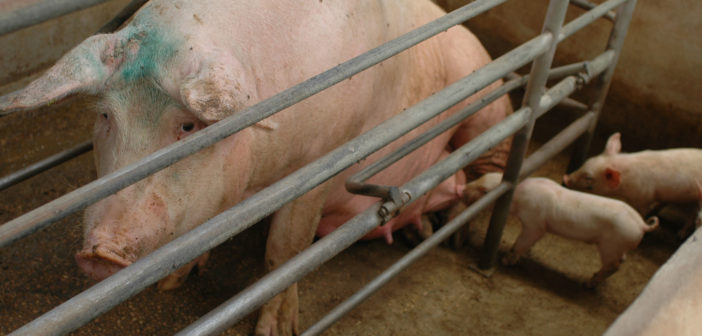As one of the most intensively farmed animals on the planet, pigs on factory farms live miserable lives. The suffering of mother pigs is especially acute; three out of four of the world’s mother pigs are imprisoned in steel cages, inside giant warehouses, where they never feel the earth beneath their feet, see the sky above their heads, or even take a breath of fresh air.
Steel bars separate these highly social animals from other pigs. To maximize profit, mother pigs are forced to give birth to large litters of piglets, over and over again, until their bodies are worn out. Mother pigs are stuffed into cages so small that they cannot even turn around and made to lie in their own excrement. Their muscles wither and they become weak. They can develop skin lesions, painful lameness, digestive problems and lung disease. Mother pigs spend almost their entire lives in cages, unable to behave naturally.
In addition to the physical cruelty, mother pigs are psychologically tortured, too. Being kept in cages for pregnancy means they’re prevented from building nests. They are denied the opportunity to bond with their offspring. Piglets are heartbreakingly torn from their mothers just a few weeks after birth. Similar to how people would react, both mother pigs and piglets cry out, squealing their distress at the premature separation.
Pigs are highly social and instinctually engage in nesting and other maternal behaviors. Forcing mother pigs to live under such duress puts them at risk of postpartum depression, not unlike human moms. A recent report by scientist Courtney Daigle indicates that “hormonal profiles and social factors that influence the development of [postpartum depression]in humans mirror those observed in sows surrounding parturition.” That is, pigs are susceptible to the same types of emotional pain that human mothers feel.
This review also suggests that “since humans and pigs are both highly social, cognitive species, sows may require more social support during pregnancy and parturition than is currently available, [and the conditions they live in] may be counterproductive in preventing the occurrence of piglet crushing and savaging.” In other words, mother pigs are being forced to live in circumstances so cruel they can inadvertently harm their own piglets.
Free-ranging pigs prefer to live in social groups of 2-6 adult females (usually related adult mother pigs of multiple generations), along with their piglets and young adult offspring. Pigs learn social skills, including mothering ability, from living in these matriarchal groups. But the reality on factory farms is starkly different: mother pigs are socially isolated in cages for pregnancy, giving birth, and nursing their piglets, prevented from enjoying their natural social life and from learning from experienced mother pigs. Daigle observes that larger social networks of support are also vital for human moms, and can even help protect against postpartum depression.
Improving conditions for pigs on farms isn’t just better for pigs – it’s better for people. Good animal welfare reduces stress, injury, and disease, allowing for the reduced use of routine antibiotics, providing higher-quality and safer food. Higher-welfare farming isn’t just possible – it’s crucial.
We can encourage more humane farming by calling on leading food companies to ensure that pigs have a life worth living. It will take all of us working together to change the way pigs are farmed, but there’s hope – we know that consumers do care about how pigs are raised for their food. A series of international research studies conducted for World Animal Protection found that 80 percent of people in the United States were concerned after seeing the realities of commercial farming. Internationally, 72 percent believe the way factory farmed pigs are kept is “upsetting,” “wrong” or “shocking.” In the United States, nearly 90 percent of shoppers think that supermarkets have a big responsibility to ensure that pigs are treated well when sourcing pork — including pigs raised overseas as well as in the U.S.
Together we have the power to end the suffering of mother pigs. We can and must demand that major supermarket chains free pigs from cages and allow them to live in groups. We’re currently calling on Kroger, the nation’s largest supermarket chain by revenue, to step up for pigs by eliminating the use of cruel gestation crates for the pigs in its supply chain. As one of the first grocery store chains to commit to transitioning to cage free eggs, Kroger has long been a food industry leader on animal welfare. But so far, they’ve only made vague statements that they will move away from sourcing pork from systems that cage pregnant pigs. They have not yet committed to a clear timeline for progress.
We’re also calling on Kroger to get pigs out of barren living environments and provide them with enrichment. Mother pigs need nesting materials and enough room to build their nests. Piglets should be allowed to bond with their mothers. All pigs should be given materials like straw for foraging, to allow them to express natural behavior. And it’s critical to note that these changes are achievable. World Animal Protection has worked with leading pig producers around the world to ensure that mother pigs are taken out of cages, and kept in groups with room to move and opportunities to socialize. These systems are good for animals, good for business, and good for people. There is no excuse for cruelty.
We’re building a movement to empower consumers to call on supermarkets like Kroger to end the cruel treatment of factory-farmed pigs by only stocking humanely raised pork products. Sign our petition to Kroger now to add your voice to the chorus of voices speaking out for mother pigs and piglets. Together, we can reduce cruelty and raise the quality of life for countless pigs around the world.
Sign the petition on behalf of mother pigs and piglets now!
Featured image courtesy Kim Bartlett / Animal People, Inc.





